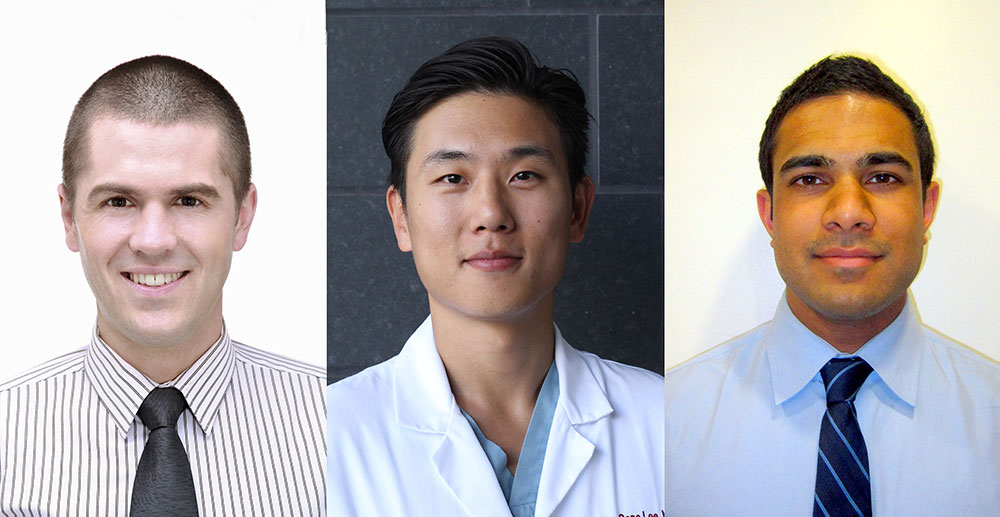
From left, Broad Clinical Research Fellows Christopher Schlieve, Gene K. Lee and R. Kiran Alluri
The second cohort of Broad Clinical Research Fellows is making strides towards finding stem cell-based therapies for lymphedema in cancer patients, large bone fractures and short bowel syndrome.
To support full-time research related to stem cell biology and regenerative medicine, each fellowship provides $65,000 of salary support, $7,500 for supplies and a $1,500 meeting allowance, and is potentially renewable for a second year.
A general surgery resident at the Keck School of Medicine of USC, Gene K. Lee will explore a stem cell-based treatment for lymphedema, a painful swelling of the limbs that can result from the surgical removal of cancerous lymph nodes.
Lee will reprogram rat skin cells into stem cells, which he will then implant onto a special scaffold in the limbs of rats suffering from lymphedema. The hope is that these stem cells will form new lymph nodes and channels to mobilize the excess fluid out of the lymphedematous limbs.
“The current state of treatment for lymphedema mainly revolves around conservative decongestive therapies and surgery in select populations,” said Lee. “The objective of our current proposal is to push the frontiers of stem cell and tissue engineering technologies to develop an advanced lymphedema therapy that is clinically translatable to post-lymphadenectomy cancer patients suffering from lymphedema.”
Lee will perform this work under the mentorship of two faculty members in the Keck School’s Department of Surgery: Young Kwon Hong and Alex Wong.
Orthopaedic surgery resident R. Kiran Alluri will focus on ways to use stem cells to treat critical bone defects, or fractures that are too large to heal on their own. He plans to deliver human stem cells that produce a protein that encourages bone growth, called BMP-2, to rats with critical bone defects to promote healing.
“The treatment of critical bone defects presents a substantial challenge in orthopaedic surgery and can be secondary to infection, trauma, joint replacement or tumor in both pediatric and adult populations,” said Alluri. “My current basic science research interest focuses on alternative forms of bone regeneration through tissue engineering.”
Alluri will conduct this research under the mentorship of Jay R. Lieberman, professor and chairman of the Department of Orthopaedic Surgery at the Keck School, and professor of biomedical engineering at the USC Viterbi School of Engineering.
In the laboratory of Tracy C. Grikscheit at Children’s Hospital Los Angeles, surgeon-scientist Christopher Schlieve will work to create stem cell-derived intestines for patients with short bowel syndrome (SBS), which leaves them unable to absorb adequate nutrition after losing part of the intestines due to infection, impaired blood flow, injury or surgery.
The Grikscheit Laboratory has already succeeded in taking the first step in growing human stem cell-derived tissue-engineered small intestine (TESI) in a mouse. However, this TESI lacks the proper nerves to contract the intestines and move food through the system. Schlieve’s goals are not only to add nerves to the stem cell-derived TESI, but also to do so in a pig—so that the intestines will be the correct size to transplant into a human newborn baby with SBS.
“As a Broad Clinical Research Fellow, I hope to build upon my previous experiences to help advance the field of regenerative medicine and provide a better quality of life for my patients,” said Schlieve. “If successful, this method may provide a novel approach to treat devastating inherited and acquired gastrointestinal diseases.”
The Eli and Edythe Broad Foundation is also funding clinical fellowships at the University of California, Los Angeles (UCLA) and the University of California, San Francisco (UCSF)—which, like USC, have stem cell research centers established with support from Eli and Edythe Broad and the California Institute for Regenerative Medicine (CIRM).
“Physician-investigators play a critical role in translating laboratory discoveries into patient cures,” said Andy McMahon, director of USC’s stem cell research center. “We are grateful to Eli and Edythe Broads for their vision in supporting these transformative and dedicated members of our stem cell research community.”
By Cristy Lytal